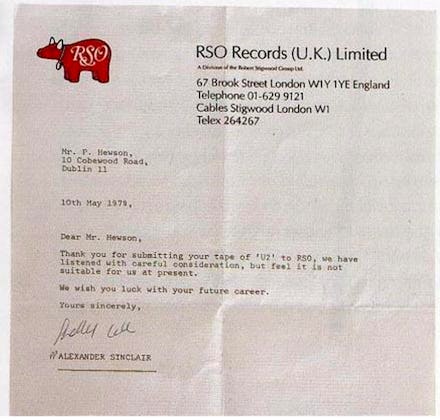This Rejection Letter Is One of the Biggest Mistakes in Music History

In 1979, 3 1/2 years after drummer Larry Mullen, Jr. started asking around his high school to see if anyone wanted to start a band, U2 had most of an album written and nobody who wanted to release it.
That year, Paul Hewson (aka Bono) wrote to RSO Records to inquire about a record contract. RSO was a good label, albeit one with an unfortunate logo (see below). In their day, they represented the Bee Gees, Eric Clapton and Andy Gibb. But they didn't want anything to do with U2, and sent "Mr. Hewson" this rejection letter:
It only took a few years for the band to prove that this was a mistake.
U2's best music sounds like resilience and faith because that's what the members stand for. And in spite of the rejection, they made their record. A little more than four months later, the band released U2:3, an EP featuring the single "Out of Control," which topped the charts in Ireland.
The next year, they released their first full-length album, Boy, and their first big hit, "I Will Follow."
RSO Records folded in 1983, four years after that letter was sent and the same year that U2 released "Sunday Bloody Sunday." Over 30 years later, U2 performed "Ordinary Love," a song about Nelson Mandela, at the Academy Awards. This spring, they'll release their 13th studio album.
But U2 isn't inspiring because they made it when RSO couldn't. Even in success, they were — and are — continuously failing. On the web, where this article will live, they barely generate any buzz anymore. And this isn't the first time they've had to go away and "dream it all up again."
But these early songs remind of something important. To listen to U2 is to remember that they are defined less by a consistent sound than an insistent hope. The band's career is marked by its yearning — its unflagging search for a sound that actually could change the world — not its success.
Today, they're the same band they were in 1979: inspiring not because they've succeeded, but because they won't let go, even when it seems like they might be gone.